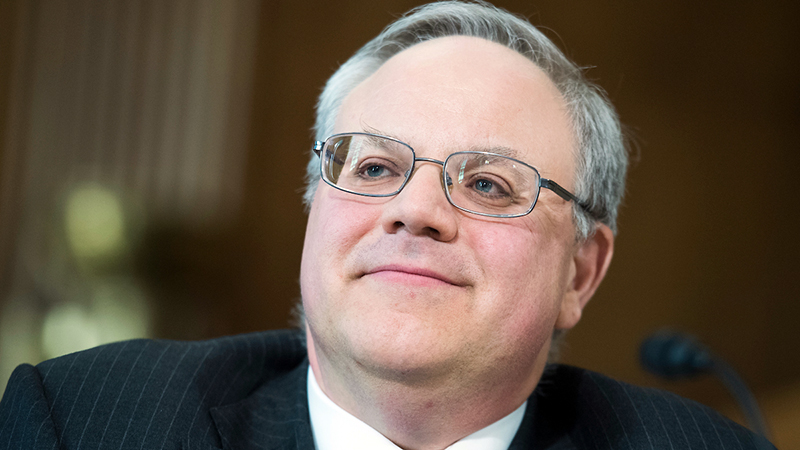After Trump’s conservation fund reversal, senators are urged to get on board
Even before the president reversed course, senators said they intended to ignore his budget proposal

A day after President Donald Trump urged Congress to fully fund a conservation program that he proposed cutting, Interior Secretary David Bernhardt told Senate appropriators to “start rowing together” to get the president what he now says he wants.
Whiplashed senators, led at the Wednesday hearing by Interior-Environment Appropriations Chairwoman Lisa Murkowski, told Bernhardt that even before the president’s about-face on Tuesday, the committee was likely to disregard the request to nearly eliminate financial support for the popular Land and Water Conservation Fund.
And, Murkowski told Bernhardt, there are other parts of the Interior budget “where we believe you have fallen short.”
After all, the Alaska Republican said, the White House budget request is just a request, and “Congress will work together to enact the final budget for the department.”
Bernhardt would not say if he was surprised by the president’s reversal, saying only that the “bean counters” at the Eisenhower Executive Office Building had “heart palpitations” when they saw Trump’s tweet that contradicted the budget request.
“I’m not going to discuss my conversations with the president,” Bernhardt told the senators.
Instead, he said all lawmakers should “grab an oar and start rowing together,” to get LWCF legislation to the White House.
The popular program uses money paid by private oil and gas operators to acquire and maintain public lands and a variety of outdoor recreation amenities.
The Interior budget proposal called for a 97 percent cut to funding for the program in fiscal 2021. The Trump White House has proposed nearly eliminating all funding for the program in each of its four budget proposals, and Congress has disregarded those requests.
Trump’s expression of support for the program surprised but pleased many lawmakers.
“It’s almost too good to be true, but we’ll take it for what it is,” Sen. Jon Tester, D-Mont., said at the budget hearing. Fellow Montanan Steve Daines, a Republican, urged lawmakers to seize the moment.
“We have an opportunity with the president on board,” said Daines said. “There are few issues that unite Congress anymore; public lands remain one of them.”
Additional cuts
Overall, the White House has proposed cutting Interior’s spending to $12.7 billion, 13 percent below the $14.7 billion enacted in fiscal 2020, with cuts across the board, including to research, Native American programs, the U.S. Geological Survey and federal land acquisitions.
“I expect that we will restore many of these cuts in a bipartisan way,” said the panel’s ranking member, Tom Udall, D-N.M. “There’s no way this subcommittee will agree to cut the Land and Water Conservation Fund by 97 percent.”
Last year, after the LWCF’s authority lapsed, Congress passed bipartisan legislation (PL 116-9) to permanently reauthorize the program.
“I hope the president is sincere in abandoning previous attempts to gut the LWCF,” Udall said.
He asked Bernhardt whether he could assure lawmakers that the whole administration would support full funding for the program.
“The president made his comment and I’m 100 percent confident everybody is getting in line,” Bernhardt responded. “But it will depend on Congress acting.”
Bernhardt told lawmakers that the budget proposal reflects Trump’s goals of prioritizing taking care of public lands and making them more accessible for recreation while expanding exploitation of minerals in those areas.
The budget request would boost spending for energy exploration on federal lands and waters; it would set aside $796 million for energy development programs, including for oil, gas, coal and renewable energy. The Bureau of Ocean Energy Management, which falls under Interior, would receive $188.8 million for offshore energy and mineral development.
The administration’s energy agenda includes a plan to continue efforts to open the Arctic National Wildlife Refuge in Alaska for drilling, which was written into the 2017 tax overhaul law.
Florida
Sen. Marco Rubio, R-Fla., who has objected to the administration’s plan to expand offshore oil and gas drilling off Florida’s coasts, asked whether Bernhardt would commit to meeting with state and local authorities and take their views into consideration as the agency pursues its offshore plans.
“The reason is really not because of energy but because of the circumstances in Florida that are very unique,” Rubio said, citing the potential impact of a drilling accident on Florida’s beaches and tourism and on the Department of Defense operations there.
[In Florida, Democrats aim to wrap Trump in his offshore drilling plan]
“The law requires us to do that, and we absolutely will do that,” Bernhardt said.
Still Democrats on the panel pressed the secretary on several issues and proposed budget cuts they said would set the country and the environment back, including changes to national monument designations, expanding oil and gas drilling, “ignoring the voices of Native communities,” and weakening protection for endangered species.
“Simply put, the president’s vision is moving us backward at a time when we can least afford it, when the need for us to tackle crises like climate and mass extinction has never been more urgent,” Udall said.
“With all due respect, Senator Udall, ” Bernhardt replied, “the president’s vision is moving us forward, not backward.”





